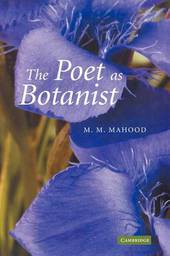
|
The Poet as Botanist
Paperback / softback
Main Details
| Title |
The Poet as Botanist
|
| Authors and Contributors |
By (author) M. M. Mahood
|
| Physical Properties |
| Format:Paperback / softback | | Pages:282 | | Dimensions(mm): Height 229,Width 152 |
|
| Category/Genre | Literary studies - poetry and poets
Botany and plant sciences |
|---|
| ISBN/Barcode |
9780521188722
|
| Classifications | Dewey:821.009364 |
|---|
| Audience | | Postgraduate, Research & Scholarly | | Professional & Vocational | |
|---|
| Illustrations |
Worked examples or Exercises
|
|
Publishing Details |
| Publisher |
Cambridge University Press
|
| Imprint |
Cambridge University Press
|
| Publication Date |
3 March 2011 |
| Publication Country |
United Kingdom
|
Description
For centuries, poets have been ensnared - as one of their number, Andrew Marvell put it - by the beauty of flowers. Then, from the middle of the eighteenth century onward, that enjoyment was enriched by a surge of popular interest in botany. Besides exploring the relationship between poetic and scientific responses to the green world within the context of humanity's changing concepts of its own place in the ecosphere, Molly Mahood considers the part that flowering plants played in the daily lives and therefore in the literary work of a number of writers who could all be called poet-botanists: Erasmus Darwin, George Crabbe, John Clare, John Ruskin and D. H. Lawrence. A concluding chapter looks closely at the meanings, old or new, that plants retained or obtained in the violent twentieth century.
ReviewsReview of the hardback: 'Mahood's grasp of the history of botany and botany as a whole is admirable; few professional botanists, working as they do in ever more specialised fields, could match her overview of their subject. ... Mahood leads, almost forces, us to look at both botany and poetry with fresh eyes, and notice details which we have failed to examine or study for many years.' Roy Vickery, John Clare Society Journal Review of the hardback: 'Mahood concludes ... with a thoughtful explanation of the way in which nature poetry was discredited during the twentieth century.' Ellen J. Jenkins 'Mahood's writing is both inviting and engaging, and the chapters on Erasmus Darwin, Crabbe and Clare make particularly important contributions to the growing body of scholarship on these hitherto underexplored poets.' Annotated Bibliography of English Studies
|